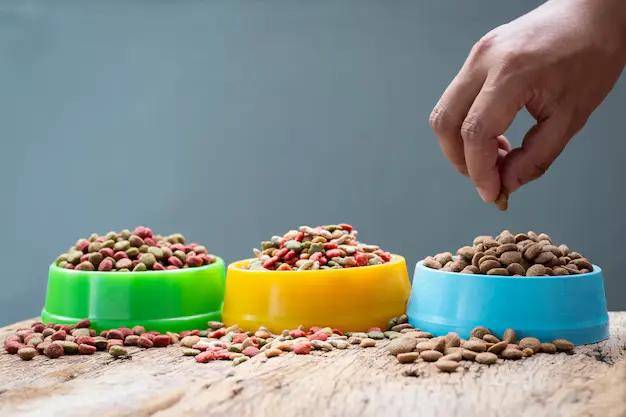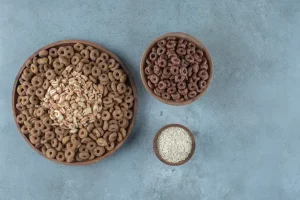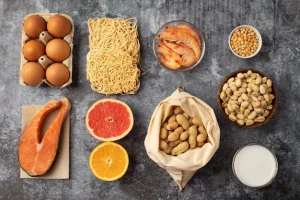
A Complete Guide to the Best Diet for Your Pet
We as pet owners want our pets to live long, happy, and healthy lives. An important fact about them is they need to have a diet that fulfills their nutritional needs. Given the thousands of pet food products on the market, it can be hard to know what is the best diet for your pet. In this guide, we will take a look at various pet food options and also delve deeper into some of these, including comparisons between homemade and store-bought pet food options, grain-free diets, and common pet nutrition queries.
Which Food is Best for Pets?
When it comes to the perfect pet food, it depends upon the age, breed, weight, exercise, and pre existing medical condition. There are different types of food that we eat, the majority of them are fundamental to a balanced diet such as proteins, fats, carbohydrates, vitamins and minerals; they apparently help us to maintain a healthy body.

- Young Animals: Puppies and kittens need more protein and fat so they can grow more quickly.
- Adult pets need a balanced diet for their energy and weight.
- Older pets may require fewer calories but calcium and omega-3 fatty acids to support their joints.
Pros and Cons of Wet vs. Dry Pet Food
Wet and dry pet food have advantages and disadvantages. Knowing the difference may allow you to make the right choice for your pet. Wet food contains more moisture, which helps keep pets hydrated. It’s tastier, so if you have picky eaters, it’s generally a better option.” It is also soft and easy to chew, which can be beneficial for pets with dental issues.
But wet food is costlier and more perishable once opened. Dehydrated food is easy to store and has a long shelf life. It aids in cleaning teeth by eliminating the plaque portion. It is also less expensive than wet food. But it’s drier, so pets need to drink lots of water. Which is the best choice? A variety of wet and dry food should be good. It provides the advantages of both, aiding hydration, dental health, and a variety of tastes.
The Difference Between Homemade and Store-Bought Pet Food
Is homemade pet food healthier than commercial pet food? Each has its pros and cons.
Homemade Pet Food:
- Provides full control over ingredients, adding freshness and quality.
- Aids to accommodate certain diet needs or conditions
- Asks for meal planning to get proper nutrition.
- Requires effort and time to sense the food properly.
Store-Bought Pet Food:
- Convenient and time-saving.
- Balanced and developed by pet nutrition specialists.
- Quality varies—some use fillers and artificial additives.
- Choose high-quality brands with natural ingredients and essential nutrients.
And if you decide to prepare homemade meals for your pet, any veterinarian or certified pet nutritionist can help you make sure they get all the nutrients they need.
Grain-Free Pet Food: Does It Actually Offer Health Benefits?
Grain-free pet food has become trendy, but is it healthier? Not necessarily. Here are a few things to observe:

- Grains are a source of fibre and nutrients. Whole grains, like brown rice and oatmeal, can help.
- Grain allergies or sensitivities in some pets. Grain-free diets may be essential in these situations.
- Grain-free isn’t always better. Some grain-free foods swap out grains for starchy vegetables that aren’t necessarily better for health.
- Check with your vet before making the switch. They can advise you on whether a grain-free diet is appropriate for your pet.
Key Ingredients in Your Pet’s Diet
Part of leading your pet is to ensure that they are getting a well-balanced diet. The basic nutrients that one should consume in a balanced diet are
- Protein: To promote the growth of muscles, repair damaged tissue, and develop the overall body. They are usually located in lean meats (including chicken, beef, and turkey), fish, eggs, and plant foods, including lentils and peas.
- Fats: Make an energy-rich fuel source, aid in brain functions, and give your pet healthy skin and a luxurious coat. Fish, chicken fat, and flax seeds are high in essential fatty acids such as Omega-3 and Omega-6.
- Cabs: An essential energy source, also aid in digestive health. Other healthy carbs include whole grains (brown rice, oats), starchy veggies (sweet potatoes, pumpkin), and fibre-rich greens.
- Vitamins & Minerals: Maintains efficient immune function, preserves bone health, regulates metabolic processes. Found in an assortment of fruits but not vegetables, as well as many premium pet food supplements. Among them are Vitamin A (for vision and immunity), B vitamins (important for energy metabolism), and Vitamin D (for strong bones). Other minerals such as calcium, phosphorus, and zinc are also important.
- Water: It can be easy to forget about proper hydration; ‘water’ does not get enough credit since it should be used properly. Provide your pet with unlimited access to clean drinking water.
Common Pet Food Allergies
They become sensitive to certain food components. Food allergies have these symptoms:
- Sore skin or too much scratching
- Ear infections
- Gastrointestinal disorders (vomiting or diarrhea)
- Hair loss or dull coat
Common Allergens in Pet Food
Some foods are more prone to allergies in pets than others. The most common allergens in foods are:

1. Chicken
You find chicken in pet food a lot, but some pets are allergic to it. Its skin irritants or stomach issues make takeaway food not much fun for you and your pet.
2. Beef
Another common protein in many pet foods is beef, which can also be a potential allergen to some pets. Chicken allergies and beef allergy symptoms are similar.
3. Dairy
Like humans, some pets may be allergic to milk, cheese, and yoghurt. Pets that are sensitive to dairy can also suffer from either digestive problems or skin allergies.
4. Wheat
Wheat is a common ingredient in many pet foods, and certain pets are allergic to wheat. Itching, rashes, and digestive issues can occur with wheat allergies in particular.
5. Soy
Soy is utilized as a source of protein in pet food. Some pets can be sensitive to soy, which can cause digestive upset or skin problems.
What to Avoid in Pet Food Ingredients
Not all pet foods are the same. Others include harmful or low-quality ingredients that may impact your pet’s health. Avoid the following:
- Artificial preservatives (BHA, BHT, ethoxyquin)
- Artificial colours and flavors
- High percentages of fillers (corn, wheat, soy)
- Animal by-products (low-grade protein sources)
- WHY A FEEDING SCHEDULE IS CRUCIAL
- Maintaining a regular schedule of feeding your pet is important for its health.
Benefits include:
- Controlling metabolism and digestion
- How to avoid overeating and obesity
- Creating a routine and discipline of behaviour
Young puppies and kittens need more frequent feeding than their adult counterparts, and vice versa. Always make sure to have access to clean water with meals.
Frequently Asked Questions (FAQs)
1. What nutrients does my pet need?
Be a staple of a balanced diet: a direct source of proteins, fats, carbohydrates, vitamins, and minerals.
2. How can I tell if my pet has a food allergy?
The symptoms include itching and rashes in the skin, ear infections, and digestive issues. Consult a vet for testing.
3. What about suggested pet food ingredients to avoid?
Artificial preservatives, colours, flavors, fillers, and low-quality meat by-products.
4. Can a pet eat the same food every day?
Yes, but diversity is good to prevent nutrient deficiencies and help keep meals novel.
5. How does diet impact my pet’s coat and skin condition?
A diet in perfect balance with omega-3 and omega-6 fatty acids leads to shiny fur and smooth skin.
Feeding your pet a quality, well-balanced diet is one of the most important components of pet care. And whether it’s wet, dry, homemade, or grain-free food, always consider your pet’s unique situation first. Talk to your veterinarian so you can provide the best nutrition for your pet’s health and well-being. Such a diet will keep your Fido alive and healthy for years to come!


